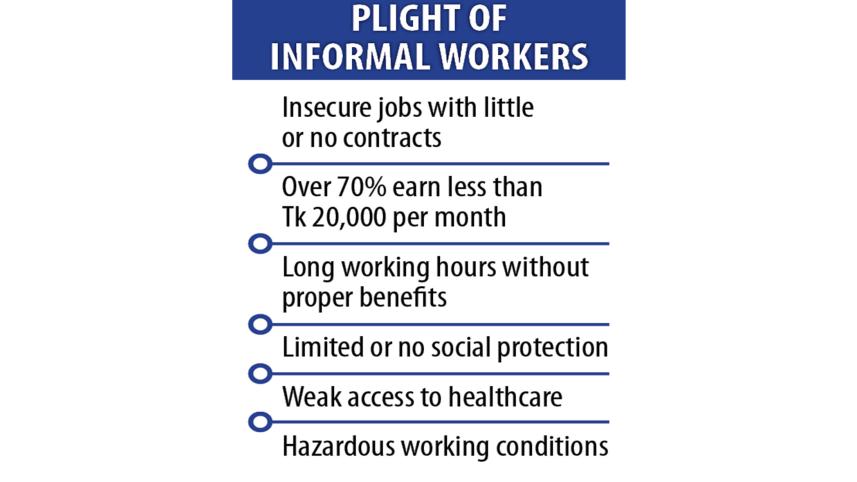Ensure legal recognition, protection for them

Speakers at an event yesterday urged the government to amend the Bangladesh Labour Act 2006 to recognise domestic, home-based, transport, waste and other informal workers, who make up 85 percent of the country's workforce.
They also called on political parties to prioritise the rights and welfare of informal sector workers in the upcoming national elections.
The demands were made at a consultation titled "National Consultation: Study Findings on Dynamic Mapping of Informal Sector Workers in Bangladesh", organised by Karmojibi Nari at The Daily Star Centre in the capital.
Speaking as chief guest, Syed Sultan Uddin Ahmed, executive director of the Bangladesh Institute of Labour Studies (BILS), stressed the need to build a comprehensive database of informal sector workers, ensure job security, provide skill development opportunities, and allow workers to report grievances to the Department of Inspection for Factories and Establishments.
He emphasised promoting organisation and unionisation and urged political parties to include informal workers' agendas in their election manifestos.
Hafiza Begum, a researcher at Adhuna Bangladesh Limited, presented the study "Mapping of Informal Sector Workers in Bangladesh: Challenges, Opportunities and Policy Implications" at the event.
The study found that informal work dominates the labour market, accounting for 85 percent of the workforce across nearly 450 occupations.
Workers face insecure jobs, long hours, low and unstable incomes, limited social protection and hazardous conditions, with women and children especially vulnerable.
Despite policy recognition and initiatives such as the National Social Security Strategy, targeted insurance schemes, skill development programmes, and support from the Ministry of Labour and Employment, Social Welfare, NSDA, PKSF, SME Foundation and the Universal Pension Authority, gaps in coordination, weak enforcement and low awareness have limited effectiveness, said the study.
It revealed that most informal workers earn modest incomes, with more than 70 percent making less than Tk 20,000 per month, while household expenditures generally range between Tk 10,000 and 19,000, leaving little room for savings.
As a result, 69 percent save Tk 1,000 or less per month, showing low financial resilience and vulnerability to economic shocks, alongside the urgent need for targeted social protection and financial inclusion.
Awareness and participation in skill programmes are also poor, with only 19.3 percent aware of such opportunities and 1.6 percent having participated, although 44.7 percent expressed interest in training.
Access to finance relies mostly on informal sources such as local associations (40.4 percent) and individuals (27 percent), while formal institutions play a minor role. Workers identified financial grants (49.5 percent), low-interest loans (30.7 percent) and skill development (11.6 percent) as key requirements for business growth.
The study also showed limited awareness of social protection schemes, with 87 percent of respondents unaware of the Universal Pension Scheme, highlighting the need for information campaigns and capacity-building.
It recommended recognising informal workers in labour laws, ratifying key ILO conventions and updating policies to address gender, age, disability and migration. It also called for better institutional coordination through a permanent Labour Commission, labour market mapping and a digital labour registry.
Other recommendations included strengthening worker representation, supporting unionisation and ensuring participation in policymaking.
At the event, Parul, an informal sector worker from Rajshahi, shared her struggles.
She said she survived by selling snacks near schools, going around villages with turmeric, chilli and dried fish, helping patients in hospitals, and even doing welding work.
She said if she had been included in any social welfare programme, she could have lived her later years with greater security and dignity.
The consultation was chaired by Umme Hasan Jhalmal, vice president of Karmojibi Nari and joint coordinator of Nari Shramik Kantha.
Special guests included Dr Felix Gerdes, resident representative of FES Bangladesh, and Dr Mohammed Hossain Sarkar, joint secretary of the Ministry of Labour and Employment.
Mustafiz Ahmed, associate professor at the Department of Social Work at Jagannath University; Rajekuzzaman Ratan, president of the Samajtantrik Shramik Front; and Ruman Ishtiaq, national project coordinator (formalisation project) of the ILO, also spoke, among others.
Sanjida Sultana, additional executive director of Karmojibi Nari, moderated the event.



 For all latest news, follow The Daily Star's Google News channel.
For all latest news, follow The Daily Star's Google News channel.
Comments